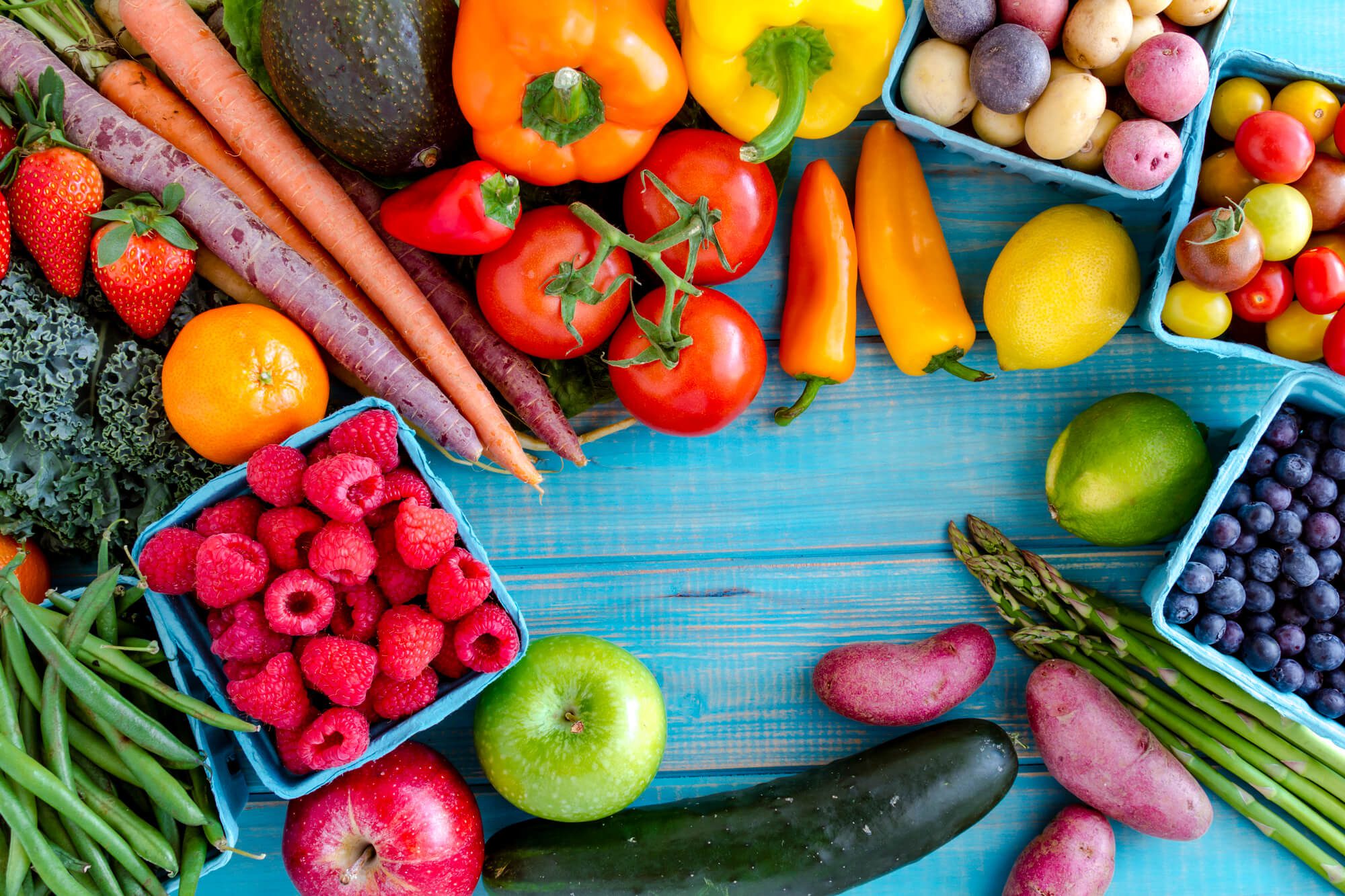The Top 5 BBQ Sauces Every Plant-Based Chef Should Stock
The Top 5 BBQ Sauces Every Plant-Based Chef Should Stock
Blog Article
All Concerning Healthy Food: Advantages of Taking On Plant Based Options
The discussion bordering plant-based diet plans has actually acquired considerable interest recently. Lots of individuals are exploring the potential health advantages, nutritional benefits, and ecological effects associated with these nutritional selections. As people end up being extra mindful of their food's influence on well-being and sustainability, questions develop about the functionalities of embracing such a way of living. What details changes can one anticipate, and how might these choices reshape not only personal health however also the earth's future?
Recognizing Plant-Based Diet Plans
Although many individuals associate plant-based diets mainly with vegetarianism or veganism, these diet plans can include a wide array of consuming patterns that prioritize whole, minimally refined plant foods. Such diet regimens often consist of fruits, veggies, whole grains, legumes, seeds, and nuts, while removing or limiting animal items. This versatility permits individuals to tailor their nutritional options according to dietary demands and personal preferences. Some might embrace a mainly plant-based diet regimen while still occasionally consuming meat or dairy, typically referred to as a flexitarian approach. The emphasis continues to be on including even more plant foods, which can bring about a varied array of flavors and meals. Understanding these various interpretations of plant-based consuming is important for valuing its access and allure in modern food society.
Health And Wellness Perks of Plant-Based Foods
The health advantages of plant-based foods are significant, providing a nutrient thickness benefit that supports general well-being. Study indicates that these foods can enhance heart health and play an essential duty in reliable weight monitoring. By including much more plant-based options, people might improve their nutritional choices and promote lasting health.
Nutrient Thickness Benefit
Nutrient density plays a vital duty in the wellness benefits of plant-based foods, making them a compelling option for those looking for a well balanced diet plan. Plant-based foods, such as fruits, veggies, vegetables, nuts, and whole grains, are often abundant in essential vitamins, minerals, and anti-oxidants while being lower in calories. This high nutrient density permits people to eat fewer calories while still satisfying their nutritional needs. Furthermore, these foods are loaded with nutritional fiber, promoting digestive system health and helping in weight administration. By including nutrient-dense plant-based choices, customers can boost their general health, sustain their body immune systems, and reduce the threat of persistent diseases. Ultimately, the nutrient density of plant-based foods emphasizes their value in a health-conscious lifestyle.
Heart Health And Wellness Improvement

Weight Monitoring Assistance
In addition to promoting heart health and wellness, a plant-based diet plan can considerably assist in weight monitoring. This nutritional approach emphasizes whole foods such as fruits, vegetables, beans, nuts, and whole grains, which are typically lower in calories and higher in fiber compared to animal-based products. The high fiber web content assists increase satiation, decreasing general calorie consumption. Additionally, plant-based diet plans are usually rich in important nutrients while reduced in undesirable fats, making it easier to keep a healthy and balanced weight. Sugar Free Sauces. Research shows that individuals who adopt a plant-based way of life often tend to have reduced body mass indexes (BMIs) and experience more successful weight loss compared to those that eat meat-heavy diet plans. Consequently, accepting plant-based choices is a critical selection for reliable weight management
Nutritional Worth of Plant-Based Active Ingredients
Plant-based active ingredients are rich in crucial nutrients, providing a varied selection of vitamins, minerals, and antioxidants that contribute to general health and wellness. A comparison of healthy protein resources discloses that while animal products are commonly deemed remarkable, numerous plant-based alternatives offer sufficient healthy protein and other helpful substances. Comprehending the dietary value of these components can aid individuals make notified nutritional options.
Necessary Nutrients in Plants
Nutrient-rich components located in plants use a diverse array of necessary minerals and vitamins that add substantially to overall wellness. These active ingredients are abundant in vitamins A, C, and K, which support immune feature, vision, and blood clot, respectively. On top of that, plants provide crucial minerals such as magnesium, potassium, and calcium, crucial for heart health and wellness, muscular tissue feature, and bone stamina. The visibility of fiber in plant-based foods aids food digestion and promotes a healthy digestive tract microbiome. Anti-oxidants, found generously in veggies and fruits, aid combat oxidative anxiety and minimize inflammation. Many plant foods are reduced in calories yet high in nutrients, making them an outstanding option for those seeking to preserve a healthy and balanced weight while making certain ideal nutrient intake.

Contrasting Healthy Protein Resources
Healthy protein sources vary substantially in their nutritional profiles, with plant-based components using unique benefits. Unlike pet proteins, which typically include saturated fats and cholesterol, plant healthy proteins tend to be reduced in these undesirable parts. Legumes, nuts, seeds, and whole grains are rich in crucial amino acids, fiber, vitamins, and minerals. Lentils supply high protein content along with substantial iron and folate, while quinoa is a full healthy protein, offering all 9 essential amino acids. In addition, plant-based healthy proteins are usually accompanied by antioxidants and phytochemicals that sustain overall health. The shift to plant-based healthy protein resources not just enhances nutritional intake however likewise aligns with lasting nutritional methods, lowering environmental influence and advertising long-lasting health benefits.
Ecological Impact of Plant-Based Consuming
As awareness of climate adjustment grows, numerous individuals are exploring lasting dietary choices that can considerably reduce their ecological footprint. Plant-based eating has actually emerged as a significant factor to reducing greenhouse gas emissions, which are primarily related to livestock production. The farming of fruits, grains, vegetables, and vegetables typically needs fewer resources, such as water and land, sites contrasted to pet farming. Additionally, plant-based diet plans can bring about decreased deforestation, as much less land is required for grazing animals or growing pet feed. By shifting towards plant-based choices, customers can sustain biodiversity and promote much healthier ecological communities. In general, accepting plant-based eating not just advantages personal wellness yet additionally stands for an essential step toward environmental sustainability and preservation efforts.
Conquering Common Misconceptions
While lots of individuals recognize the advantages of a plant-based diet plan, several misconceptions commonly prevent them from fully welcoming this way of living. A typical belief is that plant-based diets do not have sufficient protein; however, countless plant resources, such as beans, nuts, and tofu, supply ample protein. In addition, some presume that this diet regimen is pricey, when actually, staples like beans, rice, and seasonal vegetables can be fairly economical. One more mistaken belief is that plant-based consuming is overly restrictive, whereas it in fact offers a diverse array of tastes and foods. Finally, many stress that a plant-based diet plan may lead to deficiencies, yet with proper preparation, people can obtain all needed nutrients, including minerals and vitamins, while enjoying a wide range of scrumptious meals.
Tips for Transitioning to a Plant-Based Lifestyle
Making the shift to a plant-based way of life can be an improving experience, though it frequently needs some advice to browse the initial adjustments. First, individuals are encouraged to begin progressively, including even more fruits, veggies, vegetables, and whole grains into their dishes while decreasing meat and dairy intake. Meal planning is vital; preparing a regular menu can assist alleviate the modification and prevent final harmful selections. Checking out brand-new dishes and cooking techniques can additionally improve the experience and preserve enjoyment regarding plant-based consuming. Furthermore, joining support system or areas can provide inspiration and share valuable tips. Staying educated about nourishment warranties balanced dishes, avoiding shortages while promoting a healthy, rewarding plant-based way of living.

Delicious Plant-Based Dish Ideas
Exploring delicious plant-based meal ideas can inspire individuals to accept a more nutritious diet regimen. One popular choice is a passionate quinoa salad, including cherry tomatoes, cucumber, and a spicy lemon-tahini dressing. One more favorite is a savory lentil stew, packed with carrots, celery, and great smelling herbs, best for a reassuring dinner. For breakfast, overnight oats made with almond milk, chia seeds, and covered with fresh berries give a nourishing begin to the day. Additionally, a lively veggie stir-fry with tofu and a variety of colorful veggies can be a quick yet pleasing meal. Creamy avocado toast on whole-grain bread, sprinkled with seeds and seasonings, offers a simple yet savory snack. These meals display the variety and richness of plant-based eating.

Often Asked Inquiries
Can a Plant-Based Diet Offer Enough Healthy Protein?
The question of whether a plant-based diet can give sufficient healthy protein prevails. Countless sources, including beans, nuts, seeds, and whole grains, can meet healthy protein needs successfully, sustaining a well balanced and nutritious diet for individuals.
Are Plant-Based Diet Regimens Ideal for Children?
The viability of plant-based diet plans for kids depends upon mindful planning. Appropriate nutrients should be guaranteed, including minerals, proteins, and vitamins. With correct support, such diet plans can support healthy growth and advancement in kids.
How Do I Eat in restaurants on a Plant-Based Diet?
Dining out on a plant-based diet regimen includes looking for dining establishments with varied food selections, requesting for modifications, and checking out vegan-friendly choices. Planning ahead and connecting nutritional preferences can boost the eating experience while keeping nutritional selections.
What Prevail Allergens in Plant-Based Foods?
Typical allergens in plant-based foods consist of soy, gluten, nuts, and seeds - Sugar Free Sauces. People complying with a plant-based diet plan should understand these irritants and check out labels meticulously to stay clear of unfavorable reactions and ensure secure consumption
Can Plant-Based Diets Help With Fat Burning?
Study shows that embracing a plant-based diet might help with weight management as a result of its generally reduced calorie thickness and greater fiber material. This combination can boost satiety, aiding people handle their calorie consumption successfully. Lots of individuals link plant-based diets generally with vegetarianism or veganism, these diets can encompass a large variety of eating patterns that focus on whole, minimally refined plant foods. Nutrient density plays an important function in the health advantages of plant-based foods, making them an engaging option for those seeking a well balanced diet. Plant-based diets have actually been shown to markedly enhance heart health and wellness, as they typically consist of components that support cardiovascular function. In enhancement to promoting heart health, a plant-based diet can significantly assist in weight administration. A common idea is that plant-based diets lack sufficient protein; nevertheless, many plant sources, this contact form such as legumes, nuts, and tofu, supply Going Here adequate protein.
Report this page